May set to give in to demands on public sector pay


A delegation of up to 20 Conservative MPs demanded a change in policy in meetings with the Downing Street chief of staff, it was claimed.
According to reports, they received guarantees that the Chancellor will provide relief for public sector workers who have seen their pay cut in real terms every year since the Conservatives came to power.
Advertisement
Hide AdAdvertisement
Hide AdIt came as a former Tory minister called on Mrs May to raid the foreign aid budget to fund a pay rise for the worst off public sector workers.
Robert Halfon, who was sacked from his frontbench role by Theresa May after the General Election, said the 1% cap should be scrapped for lower-paid public employees.
He called for the “sacred cow” of the aid budget to be sacrificed, reversing a commitment to meet the 0.7% foreign aid target set by the UN and put into law by David Cameron.
The target is highly controversial in the Tory ranks.
“People recognise that many public sector workers have had to struggle over the past few years,” Mr Halfon said.
“I think we have to look, potentially, at sacred cows. What I’m suggesting is that we look at some of the overseas aid budget, which is going to be over £13 billion in the coming year.”
He insisted he was “passionate about overseas aid” but added: “I think we face a particular difficulty in our country where many public sector workers have had to struggle, particularly those on lower pay, so I think temporarily, while the economy remains difficult, while we get down the deficit, I think we need to look at sacred cows like the overseas aid budget and use that to help the lowest-paid public sector workers.”
On Thursday, Mrs May’s minority government saw off a Labour amendment to the Queen’s Speech that demanded an end to public sector pay restraint.
Under George Osborne, public sector pay was frozen for two years, before a cap was imposed that has been continued by Philip Hammond.
Advertisement
Hide AdAdvertisement
Hide AdThe measure was not due to be reviewed for another two years, but there were mixed signals from the government on whether it was willing to change its approach after failing to secure a majority at the general election.
Ministers hinted the cap could be reviewed and a senior Number 10 source briefed reporters that Prime Minister Theresa May accepted voters were “weary” of austerity and was ready to listen to recommendations from the independent bodies that review public sector pay - only for Downing Street to officially stress that the policy has not changed.
The 360-degree turn led to accusations of a “shambles” from shadow chancellor John McDonnell.
Grant Shapps, one of the MPs who was reported to have met Mr Barwell on Wednesday, told the Sun that government should “learn the right lessons from this election”.
“We lost because we offered people a long list of punishments, rather than hope and failed to fight for better livelihoods for everyone from the hospital nurse to the aspirational small business owner,” he said.
Another Tory MP, Johnny Mercer, said he would be “a loud voice to remove public sector pay cap for frontline workers” despite opposing Labour’s amendment - and said he would “campaign” to have the issue addressed when the Chancellor delivers the budget in Autumn.